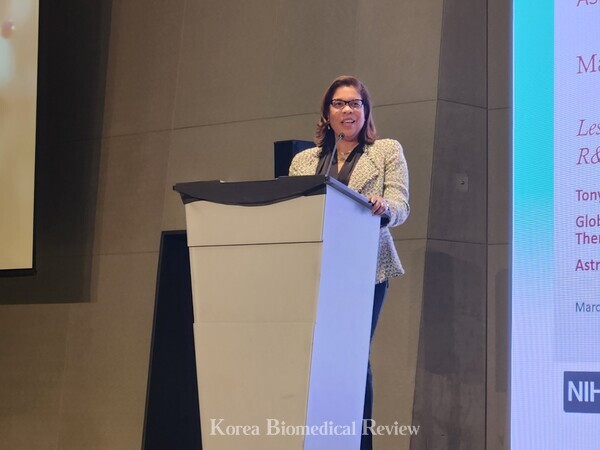AstraZeneca is renowned for its blockbuster oncology drugs.
However, the Covid-19 pandemic has recently shifted the company's focus to its infectious disease portfolio, including its Covid-19 vaccine, Vaxzevria, and treatment, Evusheld.

During the recent Global Vaccine and Immunization Research Forum (GVIRF) in Korea, AstraZeneca's Vice President and Global Franchise Head of Infectious Diseases, Dr. Tonya Villafana, said her division was “committed to developing medicines that provide effective and long-lasting immunity to protect and treat vulnerable populations where the disease burden is greatest.”
In an e-mail interview with Korea Biomedical Review, Dr. Villafana discussed AstraZeneca's aim to employ the same complementary approach to address other respiratory illnesses, such as respiratory syncytial virus disease (RSV) and influenza.
Linking the complementary approach to strategic goals
Villafana’s work focuses on developing new vaccines and medicines to prevent and treat infectious diseases impacting global populations where she leads programs from early research to product launches.
In particular, she was responsible for leading cross-functional global product development teams for Vaxzevria.
Dr. Villafana also spearheaded the team that developed a new monoclonal antibody, named Byefortus (ingredient: nirsevimab), for preventing RSV disease in infants. Byefortus was approved in the U.K. last year and is currently awaiting approval in the U.S.
“The company’s complementary approach includes vaccines for broad populations who can respond to active immunization and antibody therapies for those who can’t sufficiently mount an immune response,” she said, expressing the company's forward-looking goals.
She said her unit was specifically focused on four areas -- Covid-19, RSV, flu, and the next generation of vaccine and antibody technologies.

Additionally, she mentioned the company’s intent to pursue mucosal vaccines in addition to intramuscular vaccines despite its recent setback with the nasal Covid-19 vaccine.
AstraZeneca’s history in nasal vaccines dates as far back as 2003 when they first received FDA approval for Flumist, a nasal spray vaccine.
However, AstraZeneca was recently dealt a blow last year when its nasal vaccine based on its intramuscular Covid-19 vaccine, Vaxzevria, failed to show efficacy in phase 1 trials.
Still, Villafana contended that the company is not giving up on mucosal vaccines but stopped short of saying exactly how.
“We have experience with mucosal vaccines through our nasal spray flu vaccine, Flumist, so we are confident we can find a new way to show efficacy for our nasal Covid-19 vaccine,” she remarked.
Addressing vaccine access with Covid-19 pricing and IP barriers
In response to issues regarding the Covid-19 vaccine monopoly held by large pharmaceutical companies, Villafana said AstraZeneca was committed to providing broad, equitable access to its vaccines worldwide.
“We embraced a global not-for-profit business model for Vaxzevria in 2021, which we continued in 2022 for low-income countries.”
Approximately two-thirds of the more than 3.1 billion doses of AstraZeneca’s Covid-19 vaccines went to low- and lower-middle-income countries, and more than 580 million doses were delivered to 130 countries through COVAX, the global initiative for equitable access, she added.
Still, she emphasized that they are continuing these efforts to provide broad access beyond these regions by adopting an affordable pricing model aligned to the Gross National Income (GNI) per capita.
“This is a business model which is widely recognized and used by developers of medicines and vaccines around the world,” she reasoned.
Regarding the other elephant in the room pertaining to intellectual property (IP) waivers, the AstraZeneca Global Franchise Head of Infectious Diseases revealed that the company has joined forces with other life sciences companies alongside the Bill and Melinda Gates Foundation (BMGF). Accordingly, they have signed an agreement to enhance access for everyone around the world to Covid-19 vaccines, therapeutics, and diagnostics, regardless of their income.
Of note, she highlighted, “We initiated technology transfers and built strong manufacturing capabilities in countries like Brazil and Thailand, leaving a legacy behind to help these countries be better equipped for the next pandemic.”
She also drew attention to another case in India, where they entered a sub-licensing agreement with one of the world's largest vaccine manufacturers, the Serum Institute of India (SII), to manufacture and supply up to one billion doses of Vaxzevria under the brand name, Covishield, to low-and middle-income countries.
“This represented a key part of our efforts to bring Vaxzevria to low-and-middle-income countries and beyond,” she recalled.
AstraZeneca also possesses a biopharmaceutical collaboration with Samsung Biologics for manufacturing AstraZeneca medicines such as Evusheld, a Covid-19 long-acting antibody combination, and other immunotherapy products.
Accordingly, the Covid-19 vaccine manufactured in Korea was exported to more than 80 countries through COVAX, she said.
Preparing for future pandemics
Villafana expressed optimism that several key lessons from the pandemic would help people address future pandemics.
Dr. Villafana emphasized the significance of improving monitoring systems, research, manufacturing options, and funding mechanisms through sustained collaboration among governments, academic institutions, and industry players, as was demonstrated during the Covid-19 pandemic.
According to a modeled outcome analysis by Airfinity which was published in The Lancet, AstraZeneca’s vaccine helped save an estimated 6 million lives in the first year of vaccination alone.
“I am proud of the significant impact that our vaccine has made in saving lives and protecting the most vulnerable through the pandemic and we will continue to work on vaccines and antibody therapies in infectious diseases even during the endemic,” she reassured.
Still, Villafana maintained that collective efforts are required to transform clinical trials through improved digital infrastructures and continuous investment in data governance and systems required to accelerate clinical trials.
“Unprecedented levels of international regulatory cooperation accelerated access to life-saving Covid-19 vaccines, but there needs to be more focus now on harmonizing these efforts to ensure we are ready for the next pandemic,” said the AstraZeneca executive.

